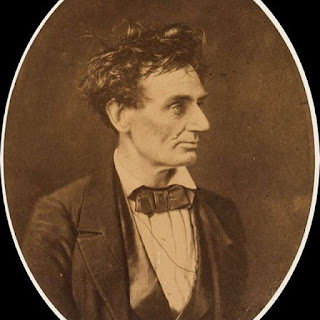The people of Springfield, Illinois little realized what destiny held for Abraham Lincoln. Most pitied him.
He suffered a melancholic depression after the love of his life, Ann Rutledge, died. Later, married to a virago, Mary Todd, who embarrassed him with her envious, hostile outbursts, he withstood twenty-two years of her verbal abuse.
His ill-fitting clothes often had buttons missing and always needed pressing. Tufts of grass grew in the accumulated dust on his office bookshelves.
Prior to being elected President, he lost eight elections—state legislature, speaker of the state legislature, elector, US Congress (twice defeated), land officer, US Senate (twice defeated), and a vice-presidential nomination.
Beset by business insolvency twice, he spend 17 years paying off his debt. Until the day he left for Washington, he milked his cow, groomed his horse, and cut his own firewood. Cash short, he borrowed money from friends for his Presidential inauguration trip.
Most of the people opposed Lincoln most of the time. Even his relatives voted against him! When he ran for President, only one cousin on his mother’s side, and none on his father’s side, cast a ballot for him. Twenty of the twenty-three ministers in his hometown opposed him.
Lincoln became President because the three other candidates in the election split the vote allowing Lincoln to enter office backed by two votes out of five. Almost sixty percent of the population opposed him.
General McClellan, the commander of the Army of the Potomac, constantly insulted the man that appointed him. Once when Lincoln visited him, McClellan kept him waiting for half an hour. On another occasion, informed that Lincoln had been waiting for hours to see him, McClellan crept to his bedroom and sent word that he had gone to bed. When urged to dismiss McClellan, Lincoln replied that he was willing to hold McClellan’s hat, if he would bring victory to the North.
Almost every man in the cabinet considered himself superior to Lincoln. Salmon P. Chase, Secretary of the Treasury, shocked at Lincoln’s country ways, criticized him ceaselessly. When urged to crush Chase, Lincoln countered that revenge did no one any good. Later, despite continued caustic attacks by Chase, Lincoln appointed him Chief Justice of the Supreme Court because he felt he was the best man for the position.
Edward M. Stanton called Lincoln “a painful imbecile” and “the original gorilla.” In making what proved one of his wisest appointments, Lincoln set aside his pride to appoint Stanton Secretary of War.
Lincoln had this to say about his critics:
I do the very best I know how—the very best I can; and I mean to keep on doing so until the end. If the end brings me out all right, then what is said against me won’t matter. If the end brings me out wrong, then ten angels swearing I was right would make no difference.
Take away message:
As long as we are doing the right thing and are doing our very best, we can be unconcerned about what others think and say about us if the comments are vile and malicious. Of course, we should welcome constructive feedback, negative or positive. Otherwise how can we grow and learn.
